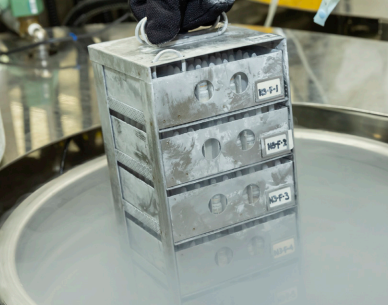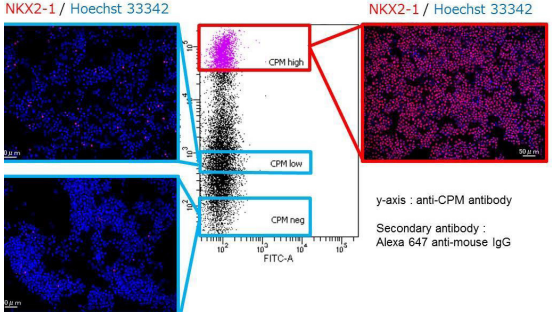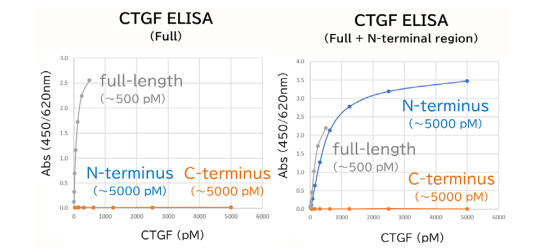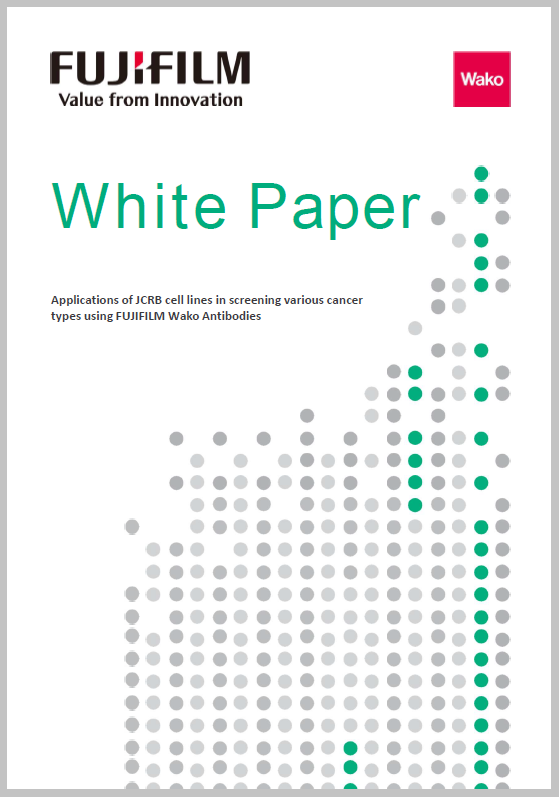Applications of JCRB cell lines in screening various disease types using Fujifilm Wako Antibodies
Overview
As cancer treatments shift from chemotherapy to personalized therapy using molecular targeted cancer drugs, the scope of molecular biological research on cancer is expanding. Use of antibodies in molecular biological methods have greatly enhanced our understanding of physiological phenomena occurring in cancer cells.
Fujifilm Wako provides various kind of JCRB cell line products for cancer research.
JCRB Cell Lines

JCRB (Japanese Collection of Research Bioresources) is one of the most comprehensive cell banks in the world for pure and applied science, spanning many fields of research across the globe.
Fujifilm wako has teamed up with the National Institute of Biomedical Innovation to bring you access to over 1,600 cell lines, including lung and glioma cell lines. In Europe, we are the exclusive distributor of JCRB's comprehensive catalog of cell lines
Human Lung Cancer Cell Lines
| JCRB No. | Cell-line name | Profile |
|---|---|---|
| JCRB0815 | ABC-1 | Adenocarcinoma |
| JCRB0820 | EBC-1 | Squamous cell carcinoma |
| IFO50358 | KNS-62 | Bronchial squamous carcinoma, metastasis to brain |
| JCRB0079 | LU65 | Human cell line with giant cell carcinoma of lung |
| JCRB1019 | RERF-LC-Sq1 | Cell line established from human lung carcinoma tissue |
Human Glioma Cancer Cell Lines
| JCRB No. | Cell-line name | Profile |
|---|---|---|
| IFO50356 | KNS-42 | Glioma, GFAP-positive, S-100 and NSE-negative |
| IFO50436 | KS-1 | Glioblastoma |
| JCRB1566 | NP 2 | Human cell line derived from human glioma |
| JCRB1578 | Onda 8 | Human cell line derived from human glioma |
| JCRB0746 | YKG-1 | Glioblastoma |
Applications of JCRB cell lines
1. Toxicology and drug screening
JCRB0134 (MCF-7) cell lines are used as valuable models for toxicology and drug discovery. They retain their genome over time and can be used to perform drug screening and facilitate patient specific drug development.
2. Benefit of variety of ethnic background in patient targeted cancer therapies
JCRB offers a highly representative panel of cell lines in terms of ethnic and gender diversity, which could improve the success rate in identifying effective cancer therapeutics in cell culture models and thereby reduce drug failures in diverse human populations.
JCRB cell lines related antibodies
Fujifilm Wako offers high-performance antibodies against various molecules that can be used in combination with JCRB cell lines in contributing to the development in cancer research.
Lung cancer related antibodies
Anti CPM, monoclonal antibody (WK)
Carboxypeptidase M (CPM) is an enzyme expressed on the cell membrane surface. It cleaves arginine and lysine at the C-terminus of peptides and proteins. Recent studies have reported that CPM can be used as a marker of alveolar epithelial progenitor cells, ventral anterior foregut endoderm and liver precursor cells.1

Figure 1 represents isolation of respiratory epithelial stem cells using anti CPM monoclonal antibody (WK). (Data provided by Shimpei Goto, Graduate School of Medicine, Kyoto University)
Anti CTGF antibody

Figure 2 represents various modules of the full-length CTGF
Connective Tissue Growth Factor (CTGF) is a secreted protein of approximately 38 kDa produced by umbilical vein and vascular endothelial cells. It is involved in cell adhesion and the proliferation/differentiation of chondrocytes. Some reports showed that CTGF is involved in various diseases such as cancer, renal failure, liver failure and rheumatism.2 CTGF contains four domains, modules 1-4. The N-terminal region (modules 1 and 2) is known as a candidate biomarker of lung fibrosis.3 Fujifilm Wako has developed ELISA kits for the measurement of the fulllength CTGF and full-length + N-terminal region of CTGF, respectively. 
Figure 3 represents the result of Cross-reactivity between the full-length CTGF and N- and C-terminal fragments. CTGF (Full) ELISA Kit Wako specifically detected the fulllength and CTGF (Full + N-terminal region) ELISA Kit Wako specifically detected the full-length and N-terminus.
Lung cancer related antibodies products list
| Product Code | Product Name | Size |
|---|---|---|
| 014-27501 | Anti CPM, Monoclonal Antibody (WK) | 100 μL |
| 290-84701 | CTGF (Full) ELISA Kit Wako | 96 tests |
| 292-84901 | CTGF (Full+N-terminal region) ELISA Kit Wako | 96 tests |
| 018-27423 | Anti CTGF Module 1, Monoclonal Antibody (30D2) | 50 μL |
| 016-27424 | Anti CTGF Module 1, Monoclonal Antibody (30D2) | 1 mL |
| 015-27433 | Anti CTGF Module 2, Monoclonal Antibody (2-3) | 50 μL |
| 012-27443 | Anti CTGF Module 3, Monoclonal Antibody (3-54) | 50 μL |
| 019-27453 | Anti CTGF Module 4, Monoclonal Antibody (4-69) | 50 μL |
Glioma related antibodies products list
Glioma is a tumor formed by neuroglial cells, which support neurons. In the revised WHO 2016, molecularly informed classification criteria were included in addition to the traditional morphological diagnosis . Researchers have called attention to IDH (Isocitrate Dehydrogenase) 1/2 genes, ATRX gene, mutation in TERT promoter, and 1p/19q co-deletion as factors for molecular diagnosis of glioma.4 We provide a wide range of monoclonal antibodies appropriate for immunohistochemical staining/western blotting to recognize wild-type/mutant IDH1, IDH2, ATRX, and TERT.
| Product Code | Product Name | Size |
|---|---|---|
| 017-26751 | Anti ATRX, Monoclonal Antibody (AMab-6) | 100 µg |
| 010-26861 | Anti TERT, Monoclonal Antibody (TMab-6) | 100 µg |
| 018-24081 | Anti IDH1-R132H, Monoclonal Antibody (HMab-1) | 100 µg |
| 013-26851 | Anti IDH1-R132H, Monoclonal Antibody (HMab-2) | 100 µg |
| 015-24091 | Anti IDH1-R132S, Monoclonal Antibody (SMab-1) | 100 µg |
| 014-24061 | Anti IDH1, Monoclonal Antibody (RMab-3) | 100 µg |
| 011-24071 | Anti IDH2, Monoclonal Antibody (RMab-22) | 100 µg |
| 015-25691 | Anti Mutated IDH1/2, Monoclonal Antibody (MsMab-1) | 100 µg |
Citations
- Gotoh S., et al.: Stem Cell Reports., 2014 Sep;3(3):394-403
- Fu M., et al.: Acta Pharm Sin B., 2022 Apr;12(4):1740-1760
- Kono M., et al.: Clin. Chim. Acta, 2011 Nov;412(23-24):2211-2215.
- Ogasawara S., et al.: Monoclon Antib Immunodiagn Immunother, 2016 Oc t;35(5):254- 258.




